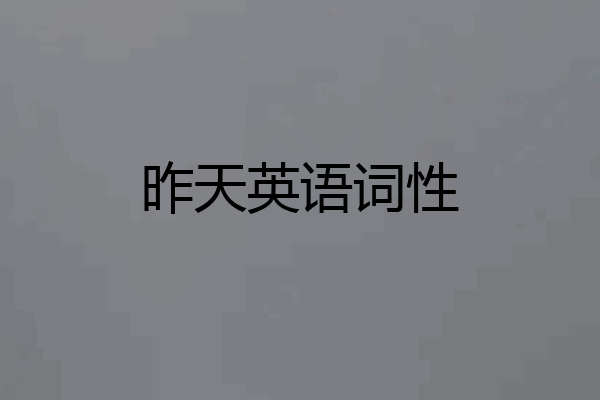
snake20001981
昨天英语是yesterday,读音[jestə(r)deɪ]。昨天说得好好的,怎么变卦了?Yesterday you agreed. What made you change your mind?昨天你看见的不是她,(而)是她姐姐。The person you saw yesterday was not her, but her elder sister.她昨天不爽。She was in a bad mood yesterday.昨天的节目比较单调。Yesterday’s programme was rather dull.他们昨天到达北京。They arrived in Beijing yesterday.他昨天递上了辞呈。He gave in his resignation yesterday.顶昨天我才听说这件事。It was not until yesterday that I learned it.


无形风9596
1,及物动词: 字典里词后标有vt. 的就是及物动词。及物动词后一般必须跟有动作的对象(即宾语)。必须加宾语意思才完整的动词,就是及物动词。
2,不及物动词: 不及物动词是不需要受词的动词。字典里词后标有vi. 的就是不及物动词。不及物动词后不能直接跟有动作的对象(即宾语)。若要跟宾语,必须先在其后添加上某个介词,如to,of ,at后方可跟上宾语。
3,名词,Nouns (n.) 表示人或事物的'名称 box, pen,tree,apple
4,代词,Pronouns (pron.) 代替名词、数词、形容词We, this, them,myself
5,形容词, Adjectives(adj.) 用来修饰名词,表示人或事物的特征 good, sad, high, short
6,数词,Numerals(num.) 表示数目或顺序 one,two, first
7,动词,Verb (v.) 表示动作或状态 Jump,sing,visit
8,副词,Adverbs(adv.) 修饰动、形、副等词,表示动作特征 there,widely,suddenly
9,冠词,Articles (art.) 用在名词前,帮助说明名词所指的范围 a, an, the
10,介词,Prepositions (prep.) 用在名词或代词前,说明它与别的词的关系 in,on,down,up
11,连词,Conjunctions (conj.) 用来连接词、词组、从句或句子的词,例如 和、但是、象及 因为 if,because,but
12,感叹词, Interjections (int.) 表示说话时的语气或感情 oh,hello,hi,yeah
拓展阅读: 可以演变出多种复杂的句子的五个基本句式:
S十V主谓结构
S十V十P主系表结构
S十V十O主谓宾结构
S十V十O1十O2 主谓双宾结构
S十V十O十C主谓宾补结构
(说明:S=主语;V=谓语;P=表语;O=宾语;O1=间接宾语;O2=直接宾语;C=补语)
1.S十V
在此句式中,V是不及物动词,又叫自动词(vi.)。例如:
He runs quickly.他跑得快。
They listened carefully.他们听得很仔细。
He suffered from cold and hunger.他挨冻受饿。
China belongs to the third world country.中国属于第三世界国家。
The gas has given out.煤气用完了。
My ink has run out.我的钢笔水用完了。
2.S十V十P
在此句式中,V是系动词(link v.),常见的系动词有:look,seem,appear,sound,feel,taste,smell,grow,get,fall ill/asleep,stand/sit still,become,turn等。例如:
He is older than he looks.他比看上去要老。
He seen interested in the book.他似乎对这本书感兴趣。
The story sounds interesting.这个故事听起来有趣。
The desk feels hard.书桌摸起来很硬。
The cake tastes nice.饼尝起来很香。
The flowers smell sweet and nice.花闻起来香甜。
You have grown taller than before.你长得比以前高了。
He has suddenly fallen ill.他突然病倒了。
He stood quite still.他静静地站看。
He becomes a teacher when he grew up.他长大后当了教师。
He could never turn traitor to his country.他永远不会背叛他的祖国。
3.S十V十O
在此句式中,V是及物动词(vt.),因此有宾语。例如:
I saw a film yesterday.我昨天看了一部电影。
Have you read the story?你读过这个故事吗?
They found their home easily.他们很容易找到他们的家。
They built a house last year.他们去年建了一所房子。
They‘ve put up a factory in the village.他们在村里建了一座工厂。
They have taken good care of the children.这些孩子他们照看得很好。
You should look after your children well.你应该好好照看你的孩子。
4.S十V十O1十O2
在此句式中,V是带有双宾语的及物动词。常见的须带双宾语的动词有give,ask,bring,offer,send,pay,lend,show,tell,buy,get;rob,warn等。例如:
He gave me a book/a book to me.他给我一本书。
He brought me a pen/a pen to me.他带给我一枝钢笔。
He offered me his seat/his seat to me.他把座位让给我。
注意下边动词改写后介词的变化:
Mother bought me a book/a book for me.妈妈给我买了一本书。
He got me a chair/a chair for me.他给我弄了一把椅子。
Please do me a favor/a favor for me.请帮我一下。
He asked me a question/a question of me.他问我个问题。
注意,下边动词只有一种说法:
They robbed the old man of his money.他们抢了老人的钱。
He’s warned me of the danger.他警告我注意危险。
The doctor has cured him of his disease.医生治好了他的病。
We must rid the house of the rats.我们必须赶走屋里的老鼠。
They deprived him of his right to speak.他们剥夺了他说话的权利。
5.S十V十O十C
在此句式中,V是有宾语补足语的及物动词。常带宾语补足语的词有形容词、副词、介词短语、名词、不定式、现在分词、过去分词,请看下面的例子。
They made the girl angry.他们使这个女孩生气了。
They found her happy that day.他们发现那天她很高兴。
I found him out.我发现他出去了。
I saw him in.我见他在家。
They saw a foot mark in the sand.他们发现沙地上有脚印。
They named the boy Charlie.他们给这个男孩起名为查理。
I saw him come in and go out.我见他进来又出去。
They felt the car moving fast.他们感到汽车行驶得很快。
I heard the glass broken just now.我刚才听到玻璃碎了。

啃鲍鱼的螺丝
1) 动词 verb [v./vi./vt.] 动词用来说句子的动作或者状态,分为实意动词和表达状态的动词。 动词在句子里面非常重要: a 每个句子都需要动词。 b 只有动词才有时态。 1、实意动词Jack plays football three times a week. 杰克一周要去踢3次足球 play 踢 ---是生理上的动作,能看见。 I am thinking about that question. 我正在考虑那个问题 think 思考----是心理上的动作,看不见。 2、表示状态的动词I [am] a teacher. 我是老师 am ,is ,are 叫be动词---------没有实际含义的动作,叫状态。2) 名词 (n.) 表示人、地点、动物、物品、感觉、想法、概念的名称的词 Jack went to Beijing on vacation with his family last year. 杰克去年和家人去北京度假了。 人:Jack 动物:dog,cat 物品:watch,pen,book 感觉:love,anger 地点:Beijing 概念: vacation, family ,year3) 代词 (pron.) 代替名词或者句子的词叫代词 为什么要代替名词,看看下面的例子: Jack is at the movies with Jack' s girl friend. Jack really enjoys spending time with Jack's girl friend. 杰克和杰克的女朋友在看电影,杰克非常喜欢和杰克女朋友在一起的时光。 改成下面的: Jack is at the movies with his girl friend . He really enjoys spending time with her. 杰克和他女朋友在看电影,他很喜欢和她在一起的时光。 1、主格代词:he,she, it...他,她,它 2、宾格代词:him,her,it...他,她,它 3、物主代词:his,her,its...他的,她的,它的4) 形容词(adj.) 给名词或者代词信息的词 Jack drives an amazing big red sports car. 杰克开了一辆超棒的大的红色的跑车。 --形容词补充下面问题,一般放在名词前面。 什么颜色 red :red car 什么尺寸 big: big car 什么类型 sports: sports car 什么感受 amazing : amazing car 什么数量 an :an amazing car5) 副词 (adv.) 给动词,形容词,副词信息的词----一般放在动词后面,形容词前面 Yesterday ,we walked somewhat slowly in a very beautiful garden to enjoy the flower. 昨天,我们在一个公园里慢慢的走着,来欣赏花。 一般补充下面问题: 什么时间 Yesterday 昨天 为什么 to enjoy the flower 去欣赏花 怎么样 【somewhat】 slowly : 【一点点】慢 (程度上怎么样) 【ver】 beautiful : 【非常】漂亮 (程度上怎么样) walked 【solwly】 :【 慢慢的】走 (动作上怎么样) 在哪里:go 【upstairs 】 上楼 -----副词和介词的区别,如北京为例:单一个词北京是副词,在北京哪里在北京外面还是里面这个就是介词,表达它们的关系的。6) 介词 (prep.) in ,on ,at , by, from, with, before ,after. 放在时间,地点,位置等词的前面,说它们之间的关系 与时间的关系 at 6:00 在6点 before 6:00 6点前 after 6:00 6点后 与地点的关系 in Beijing :在北京 near Beijing:在北京附近 beside Beijing 挨着北京 与某个位置的关系 the book is on the table. 书在桌子上。 the book is under the table. 书在桌子下。 例句: I will see you 【at】 the office 【on】 monday 我周一在办公室见你。 I will see you 【outside】 the office 【before】 monday. 我周一前在办公室见你。7) 连词 (conj.) and, but, or, so ,because 把几个句子或者词语连接起来,一起说 Jack 【and】 Jim are best friends 杰克和吉姆是非常好的朋友。 I didn't go to school today 【because】 I don' t feel very well.我今天没有去学校,因为我不舒服。8) 叹词 (int.) wow! ouch! Oops! Hey! Hi! next☞